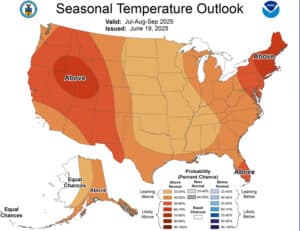A summer heatwave is already hitting the U.S. and Europe this year. Prepare for it, pack for it and make sure that you take extreme heat seriously everywhere you travel this summer.
 A heatwave hit much of the northern hemisphere in recent weeks. In my hometown of Philadelphia, in the last half of June, temperatures met or exceeded our average high temperature of 84°F two-thirds of the time, hit 90°F or more five times, and reached 97°F or higher on three consecutive days.
A heatwave hit much of the northern hemisphere in recent weeks. In my hometown of Philadelphia, in the last half of June, temperatures met or exceeded our average high temperature of 84°F two-thirds of the time, hit 90°F or more five times, and reached 97°F or higher on three consecutive days.
With heatwaves already affecting the U.S. and Europe, we must be prepared for extreme heat when we take our summer vacations there this year. The heat will affect older adults, infants and young children, as well as those with chronic medical conditions the most.
NOAA is predicting a hot summer across the U.S.
The National Oceanic and Atmospheric Administration (NOAA), released its updated weather outlook for the months of July, August, and September. They’re forecasting that every state will have a warmer-than-average summer. In fact, they’re predicting that many of the western states will experience temperatures 60 to 70 percent above normal this summer. The northeastern U.S. and southern Florida will also experience considerably higher than normal temperatures.
All summer, the prediction is that we will see heatwaves like those in June or worse. As travelers, we need to carefully choose what to wear, what to pack, what to eat and drink, and how to stay healthy during heatwaves, particularly if we’re more vulnerable to hot weather than others.
With careful planning and adherence to that plan, travelers can stay safe during heatwaves.
According to the CDC (Centers for Disease Control and Prevention) the effects of extreme heat kill about 1,220 people each year in the U.S. Fortunately, while heat related illnesses are serious, they’re also largely preventable. With good planning, smart packing, and proper care of ourselves, travelers can prevent heat-related illnesses, even during a heatwave. Remember that high humidity can intensify the effects of heat on the body. Heat exhaustion, which hits many people during a heatwave, must be taken seriously, as it can quickly escalate into heat stroke, which is a medical emergency and, according to experts, must be treated by a medical professional.
Older adults, infants, young children as well as those with chronic illnesses must work within a plan to prevent heat illnesses during heatwaves.
Travelers must recognize that older adults, infants and young children, as well as those with chronic medical conditions, are more at risk of heat related illnesses than healthy adults. If you fall into one of those groups yourself or are traveling with someone in those groups, plan your trip accordingly.
When booking your summer journey, ensure that any home, villa, apartment or hotel you book has true air conditioning, not just ceiling or other fans. While this is less of a problem in the U.S. than in Europe, don’t assume the accommodations that you’re booking are air conditioned. If you have any doubt, ask. When you get to your destination, immediately ensure that the air conditioning works.
In some rental properties, more than hotels, air conditioning may not be adequate during a heatwave.
If it’s a rental property, obtain a written confirmation of air conditioning. Ask if it’s central air conditioning or room-based. If room-based, ask what rooms are and aren’t air conditioned. Ask if there’s a thermostat that will permit you to regulate the temperature. I’d even ask if you can set the temperature as low as you need to be comfortable. I almost rented a house at the seashore awhile back. It was air conditioned, but when I asked about the thermostat, they said that its lowest setting was 76°F, but that I didn’t have to worry because the place had plenty of ceiling fans. I rented a different house with a thermostat I could set where I wanted it. A heat wave hit the town that week and the temperature was 90°F or higher every day, with night temperatures in the 80s°F.
Make sure that your rental car has air conditioning and be sure that it works properly.
If you’re renting a car, make sure the one you reserve is air-conditioned. When you pick it up, check that the air conditioning works properly. I once rejected two cars at the New Orleans airport over air conditioning. It barely worked in the first car and not at all in the second. Due to the trouble and wasted time at the rental location, I requested and received a 20 percent discount, in writing.
Don’t forget the sunscreen.
Hot sunny weather also requires that you protect yourself from the sun. According to health experts, the sun’s ultraviolet (UV) rays can damage your skin in as little as 15 minutes. Dr. Dawn Davis, a Mayo Clinic dermatologist, recommends sunscreen with a minimum SPF of 30. Everyone six months and older should wear sunscreen when outside. Infants and babies should be kept out of the sun. Apply it generously and frequently to reap its full SPF protection. Most people simply don’t use enough, nor reapply it as often as needed. Along with sunscreen, pack and wear a wide-brimmed, UV-rated hat. Baseball hats aren’t nearly as good because they don’t protect your ears or the back of your head. Pack and wear UV protective sunglasses, too.
Pack the right clothing for your summer trips. Take a water bottle and use it. Keep hydrated while traveling in summer.

Pack an empty water bottle to refill yourself, as disposable water bottles may not be available at your destination. I pack a metal insulated water bottle. If you’re concerned about local water quality, bring an electronic UV purifier and a water filter.
Give yourself time to adjust to the heat. If you’re mostly in air conditioning and then switch to an outdoor activity, be aware that your body may not be ready to handle the stress of extreme heat. It may take several days to acclimate to the new environment.
Hydrate. Hydrate. Hydrate. Drink water even before you feel thirsty in hot weather. When you feel thirsty, it often means that you’re already dehydrated by 10 to 25 percent.
Outside the U.S., don’t expect to be automatically served water at meals. While you might be charged for it, order and drink it anyway.
Use the suggested touring options explained below. Don’t drink diuretics.
While traveling, choose activities that take place in air-conditioned spaces during the heat of the day. Get an early start in the morning before it gets hot. Consider taking an evening tour, as it’s typically still light outside during summer evenings, but cooler. It even helps to walk on the shady side of the street.
You may not want to do this, but avoid alcoholic beverages, even a cold beer that might seem refreshing. Alcohol dehydrates everyone, and in hot weather, it will dehydrate you even faster than normal. Avoid coffee, tea, and colas as well. They are diuretics and will dehydrate you quickly in hot weather like alcoholic beverages.
Know whether a heatwave is possible before you depart on your trips.
Know what’s happening with weather at your destination(s) before you leave on your journey and while traveling, so repeatedly check your destination’s weather news before you leave and once there.
Not taking hot weather seriously could ruin your vacation, so plan for it, pack for it and while traveling, take appropriate measures to stay safe and healthy despite the temperature outside.

READ ALSO:
Pamplona fiesta: Reasons to return
Should airlines be held liable for your missed connections?
After many years working in corporate America as a chemical engineer, executive and eventually CFO of a multinational manufacturer, Ned founded a tech consulting company and later restarted NSL Photography, his photography business. Before entering the corporate world, Ned worked as a Public Health Engineer for the Philadelphia Department of Public Health. As a well known corporate, travel and wildlife photographer, Ned travels the world writing about travel and photography, as well as running photography workshops, seminars and photowalks. Visit Ned’s Photography Blog and Galleries.
